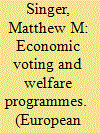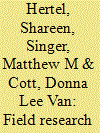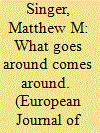| Srl | Item |
| 1 |
ID:
103991


|
|
|
|
|
| Publication |
2011.
|
| Summary/Abstract |
While scholars have hypothesised that a strong welfare state should reduce voters' incentives to base their votes on economic outcomes, evidence for this proposition remains mixed. This article tests whether differences in welfare protections across American states affect the relationship between economic performance and support for the president's party in 430 state legislative elections from 1970 to 1989. Analysing the results of over 42,000 contests in which an incumbent was running for re-election, it finds that while unemployment insurance programmes do not affect the importance of economic performance, the electoral fortunes of presidential co-partisans are less strongly tied to the national economy in states with generous anti-poverty programmes. Thus by reducing vulnerability to poverty, economic safety-nets lower the salience of the economy and provide electoral cover for politicians during economic slowdowns.
|
|
|
|
|
|
|
|
|
|
|
|
|
|
|
|
| 2 |
ID:
092542


|
|
|
|
|
| Publication |
2009.
|
| Summary/Abstract |
The availability of relatively reliable and comparable data online and the increasing emphasis on statistical and formal research methods has led many political scientists to dismiss research in foreign countries as a waste of time and money. We leave that debate to others (see, e.g., Comparative Politics Organized Section 2005; Qualitative Methods Organized Section 2004). Instead, we offer suggestions for maximizing the contributions of fieldwork to the production of original research. We pay particular attention to research in developing countries owing to the unique challenges of undertaking research there, but we believe our insights are applicable to field research more generally.
|
|
|
|
|
|
|
|
|
|
|
|
|
|
|
|
| 3 |
ID:
120135


|
|
|
|
|
| Publication |
2013.
|
| Summary/Abstract |
Voters who perceive the economy to be weak are generally less likely to support the incumbent government. Yet there is a debate over whether all people respond equally to economic shifts or if the state of the economy is more salient for those who feel economically vulnerable. This article examines whether insecure employment situations and employability concerns strengthen responses to the government's economic record. Data from Latin America and Eastern Europe confirm that workers who feel anxious about being fired or who believe it would be difficult to find a new job place significantly greater weight on sociotropic evaluations than do those with more secure employment situations. Thus incumbents who create risks for vulnerable workers are sanctioned, while those who create opportunities are rewarded most.
|
|
|
|
|
|
|
|
|
|
|
|
|
|
|
|